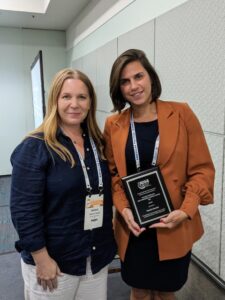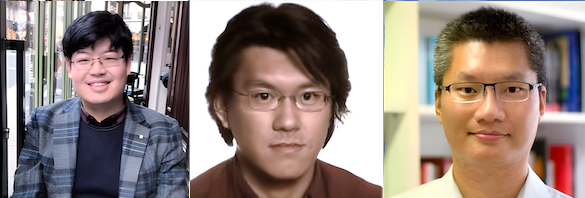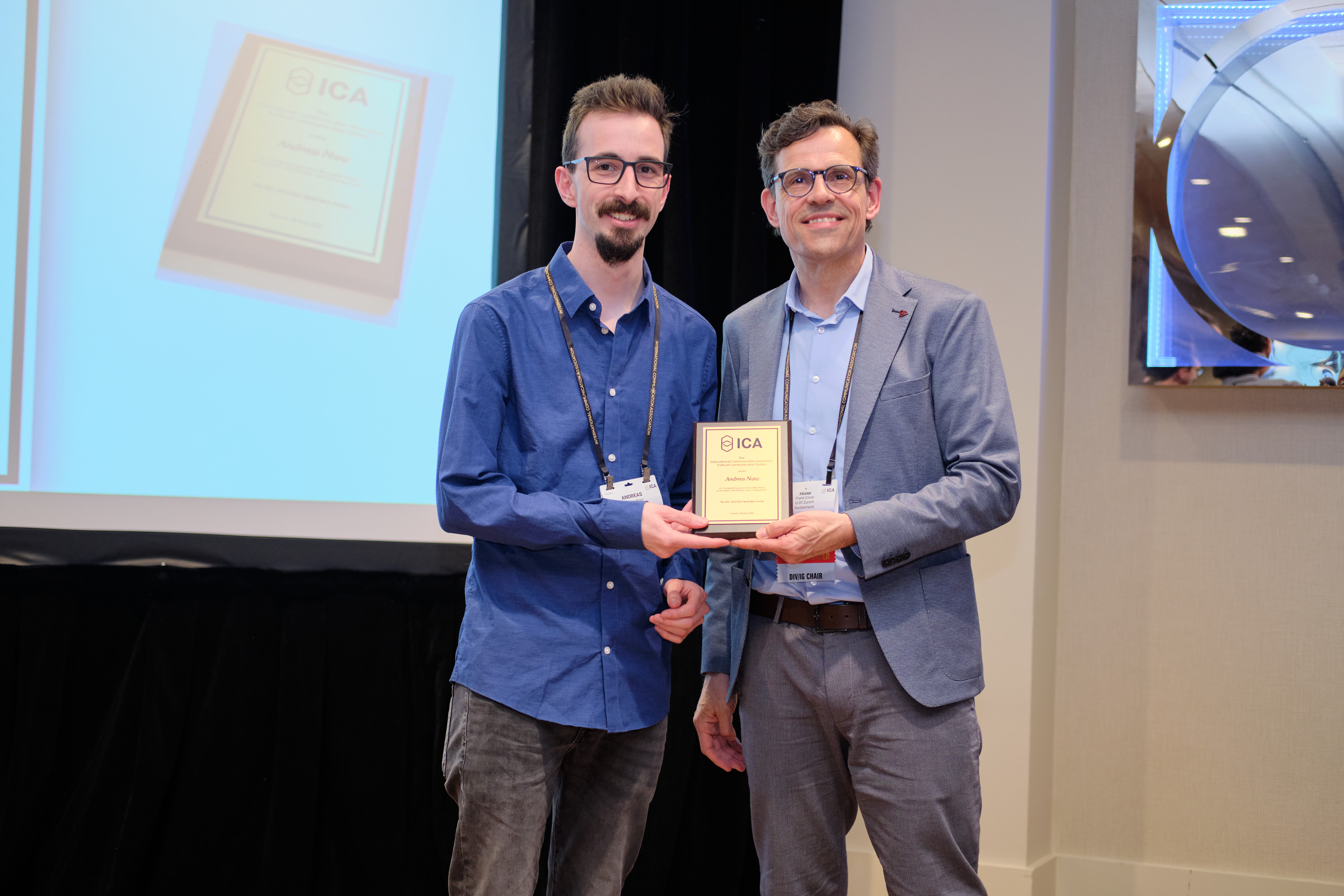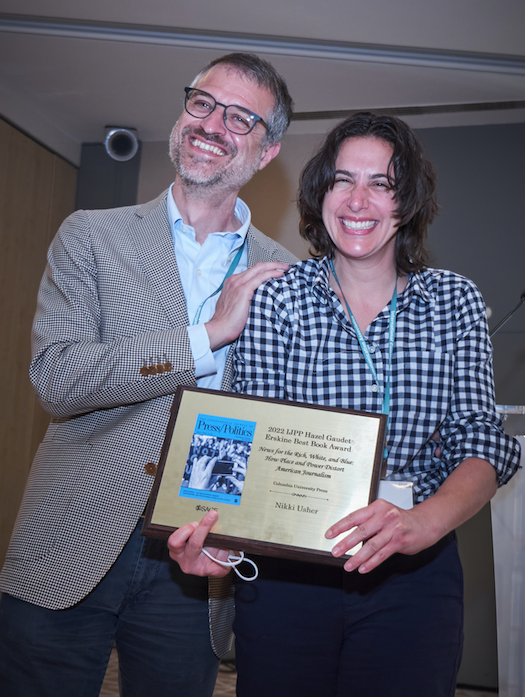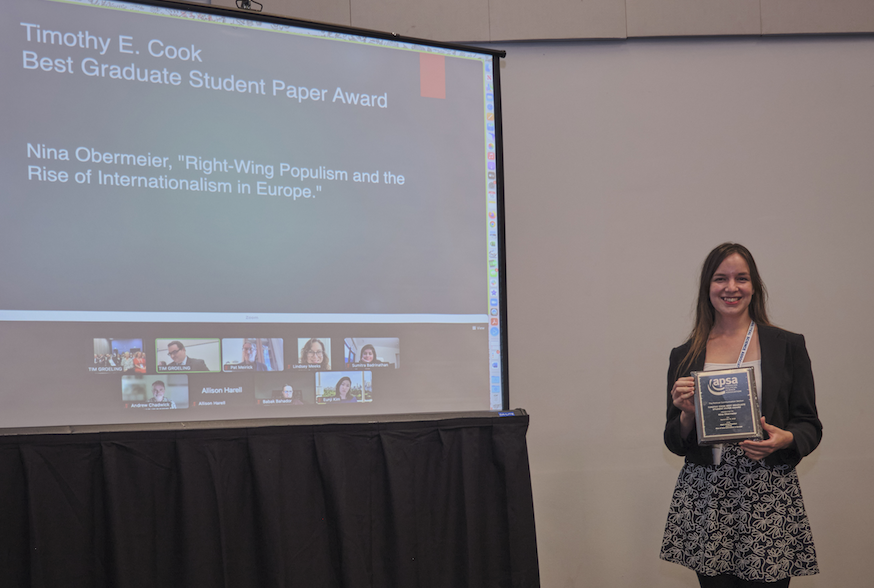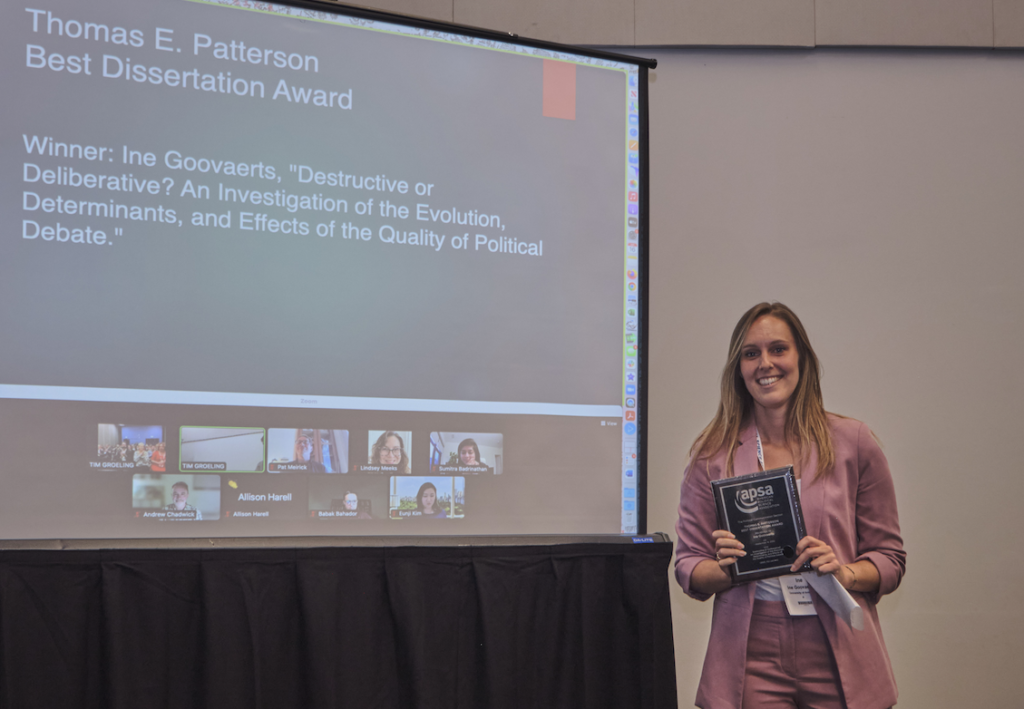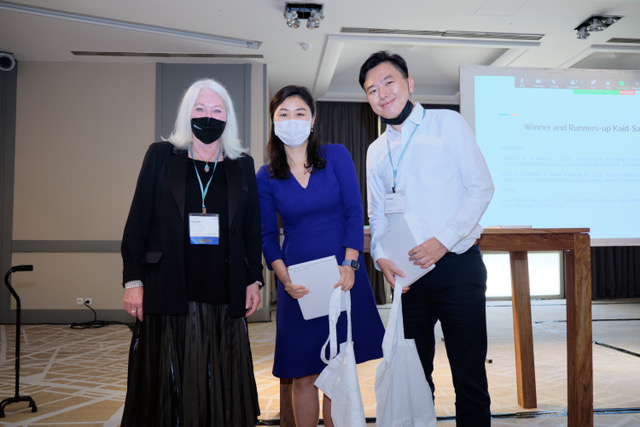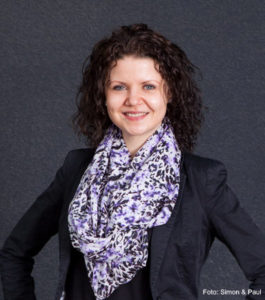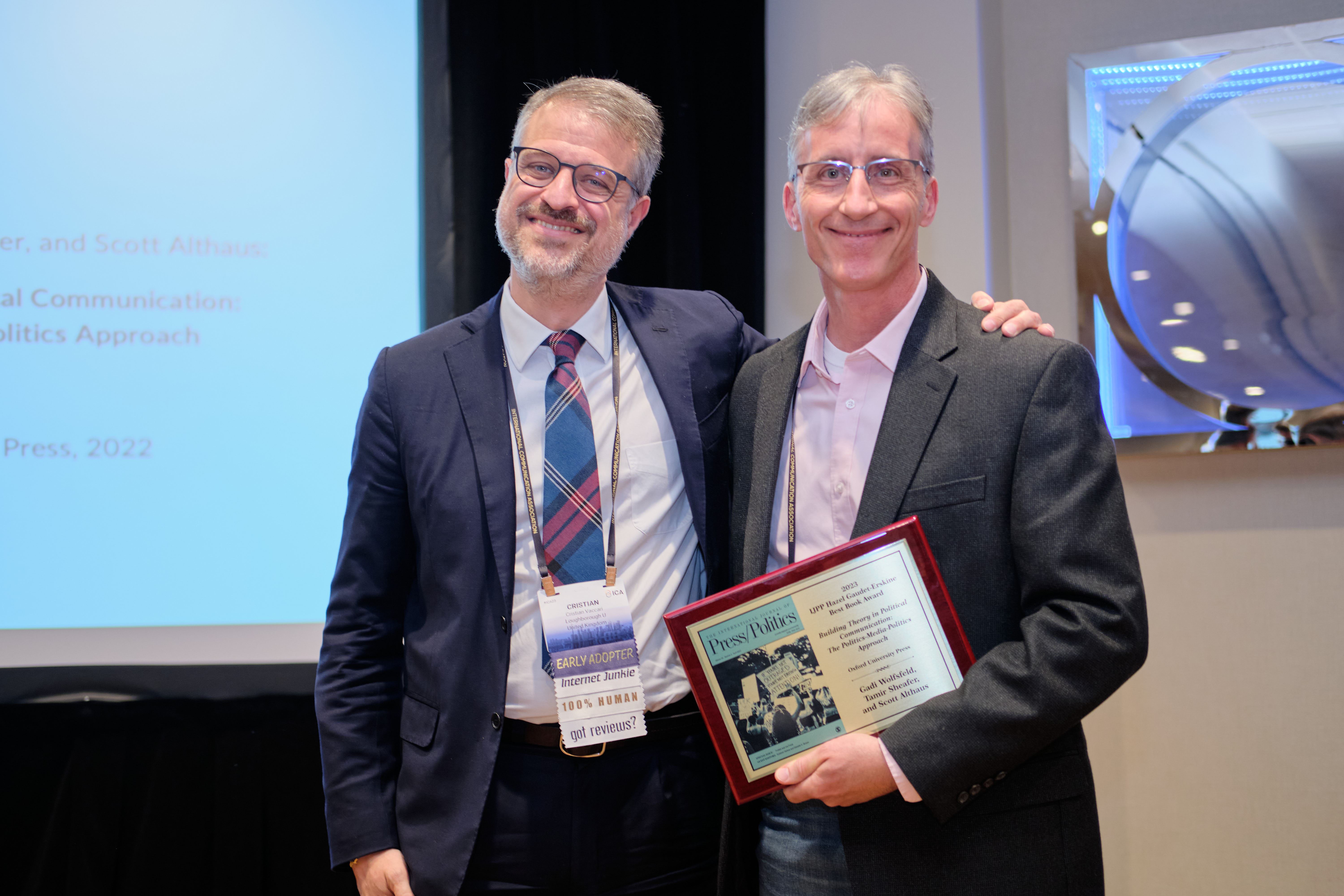
Award won:
- The International Journal of Press/Politics Hazel Gaudet-Erskine Best Book Award, 2023
Name(s) & affiliation:
- Gadi Wolfsfeld, Reichman University
- Tamir Sheafer, The Hebrew University of Jerusalem
- Scott Althaus, University of Illinois, Urbana-Champaign
Project title:
- Building Theory in Political Communication: The Politics-Media-Politics Approach. N.Y.: Oxford University Press.
Publication reference:
- Building Theory in Political Communication: The Politics-Media-Politics Approach. N.Y.: Oxford University Press.
Tell us something about you/your team and how and why you decided to focus on this research
- The book project started in 2013 when Tamir and Gadi drafted a coauthored paper for the American Political Science Association conference that proposed using the PMP approach as an organizing principle to help scholars adopt a more comprehensive approach to thinking about political communication. An extended email conversation about that paper with Scott resulted in a rough outline for a coauthored book that was shared among the three of us in October 2013. What got all three of us excited about writing this book was the pressing need in political communication, then as now, to cumulate research insights across specialty literatures, countries, and time periods so that as a field we could develop better theory that leads to more rigorous hypothesis testing. The resulting book is a step in that direction.
In 280 characters or less, summarize the main takeaway of your project.
- Building Theory in Political Communication presents the first generalizable conceptual framework for political communication that is also falsifiable, explaining how media performance contributes to successful political performance across nations, regime types and information systems. The book adapts, refines, and extends the Politics-Media-Politics (PMP) principle, which states that variations in political ecosystems have a major impact on media systems, values, practices, and resources, which can then have dependent, independent, and conditional effects on political processes. With an emphasis on international comparative studies encompassing diverse political systems, the book’s theoretical argument moves beyond the field’s Western focus to show that PMP is useful in a wide range of contexts and research literatures.
What made this project a “polcomm project”?
- The times are good for political communication research, and yet the field is also straining under the weight of its own successes. Against the ever-growing variety and scale of empirical studies, the theoretical moorings of political communication research are increasingly overextended and underexamined. The opportunities to conduct innovative research on a wide range of political communication phenomena using diverse and nuanced data sources have never been more promising, and yet our ability to synthesize insights across research literature and make collective sense of what we are finding has never been more wanting.
- We see three tensions within political communication research that exacerbate theoretical disorientation. First, although media independence from political power is widely seen as important, it remains hazily conceived, is rarely tested, and is itself a major factor in degrading effective communication between citizens and governments. Second, most of the places our field has studied for empirical insights are WEIRD: western, educated, industrialized, rich, and democratic. But most of the world is not. So while we know (or think we know) a great deal about how political communication works in the advanced democracies of Western Europe and North America, we know far less about how any of this applies to anywhere else in the world. Third, the field of political communication has aspired for decades to accumulate empirical insights relevant for the practice of democracy without quite managing ever to get around to building theory. At least, not the kind of theory that could potentially be falsified. Instead, we are good at building interpretive frameworks that pose as theories. These frameworks are necessary steps in theory construction, and there is no shame in building them. But they are intermediary steps. To realize their potential, they must then give birth to claims taking the form of predictions – claims that can be tested and potentially falsified by others. This is basic science. But instead of going the next step to generate falsifiable hypotheses, our field’s interpretive frameworks have tended to bloat outward to absorb any exceptions and anomalies that fail to confirm to initial intuitions.
- Gaining momentum against these problems requires a few elements that this book aims to supply. First, we need common points of conceptual reference to better align disparate literatures in ways that cumulate, integrate, and synthesize knowledge across specialty areas. Second, we need a clear focus on the larger systems and dynamic processes in which specific political communication phenomena are situated, so we can better see the connections between seemingly unrelated topics. Third, we need clearly defined evaluative criteria for assessing the performance of media and political activity to replace familiar expressions of knowing disappointment when media systems fail to live up to vaunted expectations. Fourth, we need these evaluative criteria to be useful across regime types (not just advanced democracies of the northern hemisphere). Fifth, we need new theoretical vistas for understanding systems of political communication that can move the field past interpretive frameworks and toward development of testable hypotheses. This book aims to start a larger conversation that will gradually supply these needed elements. We sketch a generalizable conceptual map which should have broad utility across multiple subfields, which provides some guidelines for moving beyond WEIRD cases, is agnostic to communication technologies, is capable of stimulating development of testable hypotheses, and holds potential for enduring value to the field.
- The book’s chapters aim to illustrate this concept map’s basic components, demonstrate how to apply it, and showcase its usefulness. The ultimate goal of this volume is to contribute to the joint effort for building cumulative knowledge in the field of political communication. We do so by adapting, refining, and extending Gadi’s Politics Media Politics (PMP) principle. We think of the PMP approach as an intentionally broad conceptual map that we hope will be adopted and adapted by other researchers working in the field. The book’s chapters aim to illustrate this concept map’s basic components, demonstrate how to apply it, and showcase its usefulness. Taken together, the book’s chapters serve to provide:
- A general conceptual framework for synthesizing and integrating research findings across disparate strands of the political communication literature;
- That can be applied cross-nationally and over time;
- To assess how media performance might usefully contribute to successful political performance;
- Across a wide range of regime types and information systems;
- With the purpose of cumulating knowledge across diverse and specialized research communities;
- To increase the efficiency, relevance, and practical importance of scholarly research on the practices of political communication around the world.
What, if anything, would you do differently, if you were to start this project again? (What was the most challenging part of this project? …& how did you overcome those challenges?)
- We wish we had been able to finish it in less time! The most challenging part of the project was coordinating things remotely since the three of us weren’t all in the same place. Even though we could organize Zoom meetings and send chapter drafts over email, nothing replaced the importance of “face to face” meetings in developing the theoretical concept map that the book presents. So we took every advantage to meet in person at academic conferences and workshops, and eventually we were able to complete the book. The second most challenging part was developing the language for a conceptual framework that could stand outside particular places and times and communication technologies. We wanted the book’s concept map to be used by political communication scholars anywhere in the world, looking at different aspects of communication ecosystems, across different types of political regimes, and at different points in history. We think we have accomplished this, but it took us a long time to work through alternative concepts and labels before we became convinced that the resulting elements presented in the book had the potential to meet this lofty ambition. We accomplished this by taking time to not rush things prematurely. So in the end, our second most challenging problem was solved by the first most challenging problem, because our delays in moving the book forward gave us plenty of time to refine and revisit our framework until we felt very confident in its utility.
What other research do you currently see being done in this field and what would you like to see more of in the future?
- Given the complexity of contemporary communication ecosystems, it is far easier today for scholars to do good empirical work than to do good theoretical work, and to focus on narrow superspecialty problems rather than to make our research relevant and understandable to people who aren’t already familiar with the narrow research questions that we’re individually pursuing. We hope that our book will lead more researchers to adapt the PMP approach to their own research, so that we can collectively advance the quality of both empirical and theoretical contributions within the field.
What’s next? (Follow-up projects? Completely new direction?)
- Because we’ve been thinking about the PMP approach for a lot longer than any of our readers, we’re brimming with ideas about how to apply it to more cases studies and countries. All three of us will probably be adapting it in different ways to our respective areas of research specialization, but we hope that the immediate next step is something much bigger than the three of us will be producing on our own. Our larger aim with the book is to help political communication scholars build globally-relevant theory together. We hope the book sparks a larger scholarly conversation about how to build theory in political communication that overcomes the problems we’ve identified in ways that can move our field onto firmer theoretical (and empirical) ground. This would be the most satisfying follow-up project that we can think of.

